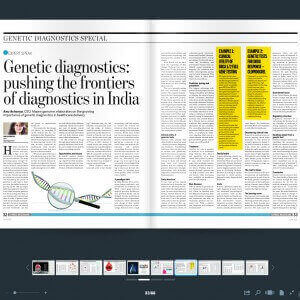Genetic diagnostics: pushing the frontiers of diagnostics in India
Jun 17, 2015
6767 Views
History teaches us that innovations in science and technology have the potential to revolutionise the practice of medicine. The most promising game changer for this century is genetics. Translational science and precision medicine are trending domains pursued by governments, industry, academia, and the medical fraternity. Pioneering medical practitioners across the globe are harnessing the power of genetics to add value to their practice. As medical science is gearing up for this paradigm shift, the question for tomorrow is not about accepting genetics, but about making sure that we are all prepared to ensure the best clinical utility of genetic tests. After the usual hype and hyperbole for a decade or so, genetics has become part of a clinical practice worldwide and has the power to revolutionize healthcare.
The reasons for this change are shown by examples of recent studies like the one published in New England Journal of Medicine that has shown effectiveness of genomic testing for detecting lung cancer to be less invasive compared to traditionally used invasive bronchoscopy tests that have proven to be inconclusive.
What has captured the fancy of most physicians is that they can now actually help patients on their treatment choices using Pharmacogenetics. Several instances have been cited where medications given to two different individuals elicits different responses. A significant percentage of people cannot metabolize clopidogrel. Genetic testing can identify individuals and can help doctors make more informed decisions.
In this article we will go through some historical background, the future, clinical utility and a couple of case studies before concluding remarks.
Opportunities and misses
In the mid – 19th century, cholera often became pandemic, causing a significant dent in population across cities and even countries. In spite of Dr John Snow (Father of Modern Epidemiology) demonstrating the link between contaminated water and the origin of cholera, medical fraternity continued to ignore this and the disease continued to flourish and wreak havoc. On the other hand, just six months after the discovery of X-ray in 1895, doctors in the armed forces were using this technique on wounded soldiers to locate bullets. Along with the discovery of tubercle bacilli in 1882, X-rays paved way for early diagnosis of tuberculosis. While one is a case of missed opportunity, the other is an example of human resourcefulness.
When Angelina Jolie announced the news of her double mastectomy and later surgery to remove her ovaries and Fallopian tubes following genomic testing, there was mixed reaction. While some hailed her for encouraging women to be proactive about her health, others criticized her for triggering an avalanche of genomic tests sans medical consultation and genetic counselling. However, the fact that she has contributed a lot more to the spread of awareness about genomic testing than any educational campaign can even aspire to be universally acknowledged. For Mapmygenome, it is heartening to see many doctors who are keen on learning more about genetic tests and their clinical utility.
A paradigm shift
In 2012, Melanie Swan of Futures Group predicted a new perspective to healthcare by 2050, where gaps between medical practice, healthcare, and personal health will be bridged. Another prediction is the predominance of preventive healthcare, where individuals take charge of their health, harnessing the power of technology. Genomic tests – single nucleotide polymorphism and whole genome sequencing – are among the key catalysts to this change.
With Health 2.0, we have seen the beginning of this change. Wellness was once a fancy word. Today, it is part of every hospital’s business strategy to engage a new generation of customers, who are actively pursuing wellness using social apps for various reasons – right from fitness and diet to finding the best doctor.
The cost of genomic testing has also witnessed a steep decline. The complete sequencing of the first human genome was an expensive project. Today, whole genomes can be sequenced at a fraction of the cost. Targeted gene sequencing and SNP analysis bring a further reduction to the costs. Advances in technology can bring down these costs further, making these tests more accessible and affordable. Powering this trend are other factors like advances in cloud computing, big data, secure electronic medical records and laboratory information management systems.

Clinical utility of genomic tests
Genomic tests have already found clinical utility in many key areas – disease prevention, diagnosis, and treatment. Translational medicine, where doctors work in tandem with geneticists, bioinformaticians, and genetic counsellors, is a reality today. Some prominent medical institutions in India and abroad have their own research facilities that are working on genetics. Many have strategic partnerships with molecular diagnostics companies such as Mapmygenome.
Early detection
It has been proven beyond doubt that early detection can enhance the efficiency of treatment while reducing healthcare costs. In cases where there is a strong familial history of a particular disease, a genetic test is advised. Even if the patient tests positive, there is a greater chance of survival. For example, genetic screening is a powerful tool for hereditary forms of colorectal cancer – Lynch syndrome and Familial Adenomatous Polyposis (FAP). A large percentage of colorectal cancer cases are hereditary and preventable. Genetic tests can identify causal mutations to diagnose the condition even before tumorigenesis, paving way for better treatment. This helps check if other blood relatives are at risk too.
Predictive testing and prevention
The biggest advantage with genetics is that people can take charge of health by preventing or delaying the onset of many health conditions. Standardized tests do not predict predisposition to high cholesterol, diabetes and other conditions. Genetic tests can be used as ‘predictive testing’ to determine the chances of a healthy individual to developing a condition, or ‘presymptomatic testing’ to determine if a person with a family history for a disease but no current symptoms have causative gene alterations for the condition. The consulting physician can recommend further tests, treatment, or prophylactic measures. Angelina Jolie’s case is a classic example. She had undergone the BRCA genetic test for breast cancer [Example 1].
Example 1: Clinical utility of BRCA 1/2 full gene testing
BRCA genetic testing is done using a blood sample to identify harmful changes (mutations) in either one of the two key breast cancer susceptibility genes BRCA1 and BRCA2. Women who have inherited these genes have a higher risk of developing breast risk and ovarian cancer compared with the general population.
BRCA test is offered to people who have a personal or family history, or who have specific types of cancer and these people are more likely to inherit these mutations. Inherited BRCA gene mutations are responsible for about five per cent of breast cancer and 10-15 percent for ovarian cancer.
A positive result implies that there is a pathogenic mutation in one of the breast cancer genes and there is a high likelihood of developing breast cancer or ovarian cancer relative to the normal population. However, the positive result does not mean that the patient will develop cancer.
Treatment
Another key role of genetics in medicine is to determine drug response. The efficacy and sensitivity of a drug varies from person to person. It may work wonders for some, cause an allergic reaction in others, and show no effect in yet others. Finding drug response through a genetic test can help patients save time and money while increasing the credibility of healthcare providers [Example 2].
Example 2: Genetic tests for drug response – Clopidogrel
Clopidogrel is a common drug majorly prescribed for cardiovascular diseases and usage of this drug is high among patients. For this drug to work, enzymes in liver (predominantly CYP2C19) must convert (metabolize) the drug to its active form. Therefore, patients who cannot metabolize the drug efficiently are called poor metabolisers. This effect of metabolism depends on certain alterations in genes. Using a genetic test, doctors who are prescribing this test can find if their patients can metabolize the drug.
Rare diseases
Clinical utility of genomics in rare diseases is beyond measure. Often in families with rare diseases, the journey from the onset of symptoms to diagnosis and treatment can take an emotional, physical and economic toll. With a genetic test, diagnosis and treatment becomes easier.
Family Health
Couples planning a family can undergo genetic testing to determine if they are carriers of a particular disease. Similarly, prenatal diagnosis is routinely used to diagnose genetic conditions in developing foetuses. Newborn screening is equally important to detect genetic disease for early diagnosis and treatment.
Costs
In many conditions, before the right diagnosis is made, there are additional psychological and economic costs on the patients, family, and healthcare providers. Genetic tests, with their non-invasive nature, simplicity, accurate diagnosis and analysis of the causative factors, can help alleviate these costs largely. For healthcare providers, this in turn translates to cost-effective healthcare.
Empowering clinical trials
Research in medical science has been forever ongoing, which helps physicians to stay ahead of causative agents of a disease. A key field of research is clinical trials, where the burden of finding the right sample group often falls on industry or academia for want of right diagnosis. With genetic tests, finding the right sample group becomes easier. Using genetic tests to analyze the response to drugs can also save on costs.
The road to future
For an innovation to scale up to its potential, all stakeholders need to power up and focus. In the West, genomic testing has become part of the healthcare lexicon. Genomic tests in India are an evolving territory that requires the right nurturing.
The learning curve
The best and most sought after medical practitioners are those who keep abreast with advancements in their domain and internalize new findings in their practice. The same goes for genomics, which can add value to nearly all domains of medicine. Pioneering medical practitioners are keenly following advances in genomics, especially in domains relevant to their clinical expertise. Some are even collaborating with the industry for path breaking research in genomics. Physicians in India need to be educated on the pros and cons of genomic testing, which can be used as a complementary diagnostic tool along with the traditional biochemical tests.
Government boost
In the United States, the latest Obama budget has allocated significant resources for the development of precision medicine. A similar boost from the Government of India can go a long way in empowering genetics and enhancing healthcare.
Regulatory structure
Regulatory structure is a cornerstone for the practice of any discipline of medicine. A strong regulatory framework keeping in mind the conclusions from genomic tests is essential.
Handling output from a genetic test
Genomic tests give information regarding the presence or absence of causative variations in DNA for a disease. It is essential that a qualified professional with sound knowledge of genes and their impact on the human body give patients the right interpretation of the report. Genetic counsellors can be an integrated part of hospitals to offer counselling along with doctors’ recommendations.
Conclusion
Genetic tests are here to stay. The clinical utility of these tests is reason enough for their acceptance by all. For the medical community, now is the right time to act – to take this giant leap into tomorrow. In a few years, the entire health care scenario is likely to change to individual-centric, with a stronger focus on prevention rather than cure. Education, government support, and regulatory structure will be of great help in implementing this technology.
About The Author
This article was first published on June 15th, 2015 in Express Healthcare. Read the original article at http://www.financialexpress.com/article/healthcare/genetic-diagnostics-special/genetic-diagnostics-pushing-the-frontiers-of-diagnostics-in-india/84997/
June 15, 2015
Anu Acharya, CEO, Mapmygenome, elaborates on the growing importance of genetic diagnostics in healthcare delivery.



